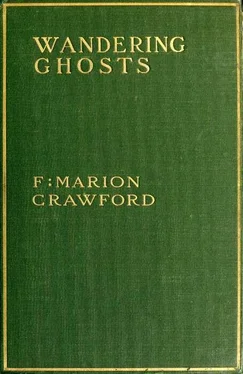F. Crawford - Wandering Ghosts
Здесь есть возможность читать онлайн «F. Crawford - Wandering Ghosts» весь текст электронной книги совершенно бесплатно (целиком полную версию без сокращений). В некоторых случаях можно слушать аудио, скачать через торрент в формате fb2 и присутствует краткое содержание. Год выпуска: 2012, Жанр: Ужасы и Мистика, на английском языке. Описание произведения, (предисловие) а так же отзывы посетителей доступны на портале библиотеки ЛибКат.
- Название:Wandering Ghosts
- Автор:
- Жанр:
- Год:2012
- ISBN:нет данных
- Рейтинг книги:3 / 5. Голосов: 1
-
Избранное:Добавить в избранное
- Отзывы:
-
Ваша оценка:
- 60
- 1
- 2
- 3
- 4
- 5
Wandering Ghosts: краткое содержание, описание и аннотация
Предлагаем к чтению аннотацию, описание, краткое содержание или предисловие (зависит от того, что написал сам автор книги «Wandering Ghosts»). Если вы не нашли необходимую информацию о книге — напишите в комментариях, мы постараемся отыскать её.
Wandering Ghosts — читать онлайн бесплатно полную книгу (весь текст) целиком
Ниже представлен текст книги, разбитый по страницам. Система сохранения места последней прочитанной страницы, позволяет с удобством читать онлайн бесплатно книгу «Wandering Ghosts», без необходимости каждый раз заново искать на чём Вы остановились. Поставьте закладку, и сможете в любой момент перейти на страницу, на которой закончили чтение.
Интервал:
Закладка:
No, I am not giving you "sharks." There isn't a shark in this story, and I don't know that I would tell it at all if we weren't alone, just you and I. But you and I have seen things in various parts, and maybe you will understand. Anyhow, you know that I am telling what I know about, and nothing else; and it has been on my mind to tell you ever since it happened, only there hasn't been a chance.
It's a long story, and it took some time to happen; and it began a good many years ago, in October, as well as I can remember. I was mate then; I passed the local Marine Board for master about three years later. She was the Helen B. Jackson , of New York, with lumber for the West Indies, four-masted schooner, Captain Hackstaff. She was an old-fashioned one, even then—no steam donkey, and all to do by hand. There were still sailors in the coasting trade in those days, you remember. She wasn't a hard ship, for the Old Man was better than most of them, though he kept to himself and had a face like a monkey-wrench. We were thirteen, all told, in the ship's company; and some of them afterwards thought that might have had something to do with it, but I had all that nonsense knocked out of me when I was a boy. I don't mean to say that I like to go to sea on a Friday, but I have gone to sea on a Friday, and nothing has happened; and twice before that we have been thirteen, because one of the hands didn't turn up at the last minute, and nothing ever happened either—nothing worse than the loss of a light spar or two, or a little canvas. Whenever I have been wrecked, we had sailed as cheerily as you please—no thirteens, no Fridays, no dead men in the hold. I believe it generally happens that way.
I daresay you remember those two Benton boys that were so much alike? It is no wonder, for they were twin brothers. They shipped with us as boys on the old Boston Belle , when you were mate and I was before the mast. I never was quite sure which was which of those two, even then; and when they both had beards it was harder than ever to tell them apart. One was Jim, and the other was Jack; James Benton and John Benton. The only difference I ever could see was, that one seemed to be rather more cheerful and inclined to talk than the other; but one couldn't even be sure of that. Perhaps they had moods. Anyhow, there was one of them that used to whistle when he was alone. He only knew one tune, and that was "Nancy Lee," and the other didn't know any tune at all; but I may be mistaken about that, too. Perhaps they both knew it.
Well, those two Benton boys turned up on board the Helen B. Jackson . They had been on half a dozen ships since the Boston Belle , and they had grown up and were good seamen. They had reddish beards and bright blue eyes and freckled faces; and they were quiet fellows, good workmen on rigging, pretty willing, and both good men at the wheel. They managed to be in the same watch—it was the port watch on the Helen B. , and that was mine, and I had great confidence in them both. If there was any job aloft that needed two hands, they were always the first to jump into the rigging; but that doesn't often happen on a fore-and-aft schooner. If it breezed up, and the jibtopsail was to be taken in, they never minded a wetting, and they would be out at the bowsprit end before there was a hand at the downhaul. The men liked them for that, and because they didn't blow about what they could do. I remember one day in a reefing job, the downhaul parted and came down on deck from the peak of the spanker. When the weather moderated, and we shook the reefs out, the downhaul was forgotten until we happened to think we might soon need it again. There was some sea on, and the boom was off, and the gaff was slamming. One of those Benton boys was at the wheel, and before I knew what he was doing, the other was out on the gaff with the end of the new downhaul, trying to reeve it through its block. The one who was steering watched him, and got as white as cheese. The other one was swinging about on the gaff end, and every time she rolled to leeward, he brought up with a jerk that would have sent anything but a monkey flying into space. But he didn't leave it until he had rove the new rope, and he got back all right. I think it was Jack at the wheel; the one that seemed more cheerful, the one that whistled "Nancy Lee." He had rather have been doing the job himself than watch his brother do it, and he had a scared look; but he kept her as steady as he could in the swell, and he drew a long breath when Jim had worked his way back to the peak-halliard block, and had something to hold on to. I think it was Jim.
They had good togs, too, and they were neat and clean men in the forecastle. I knew they had nobody belonging to them ashore—no mother, no sisters, and no wives; but somehow they both looked as if a woman overhauled them now and then. I remember that they had one ditty bag between them, and they had a woman's thimble in it. One of the men said something about it to them, and they looked at each other; and one smiled, but the other didn't. Most of their clothes were alike, but they had one red guernsey between them. For some time I used to think it was always the same one that wore it, and I thought that might be a way to tell them apart. But then I heard one asking the other for it, and saying that the other had worn it last. So that was no sign either. The cook was a West Indiaman, called James Lawley; his father had been hanged for putting lights in cocoanut trees where they didn't belong. But he was a good cook, and knew his business; and it wasn't soup-and-bully and dog's-body every Sunday. That's what I meant to say. On Sunday the cook called both those boys Jim, and on weekdays he called them Jack. He used to say he must be right sometimes if he did that, because even the hands on a painted clock point right twice a day.
What started me to trying for some way of telling the Bentons apart was this. I heard them talking about a girl. It was at night, in our watch, and the wind had headed us off a little rather suddenly, and when we had flattened in the jibs, we clewed down the topsails, while the two Benton boys got the spanker sheet aft. One of them was at the helm. I coiled down the mizzen-topsail downhaul myself, and was going aft to see how she headed up, when I stopped to look at a light, and leaned against the deck-house. While I was standing there, I heard the two boys talking. It sounded as if they had talked of the same thing before, and, as far as I could tell, the voice I heard first belonged to the one who wasn't quite so cheerful as the other—the one who was Jim when one knew which he was.
"Does Mamie know?" Jim asked.
"Not yet," Jack answered quietly. He was at the wheel. "I mean to tell her next time we get home."
"All right."
That was all I heard, because I didn't care to stand there listening while they were talking about their own affairs; so I went aft to look into the binnacle, and I told the one at the wheel to keep her so as long as she had way on her, for I thought the wind would back up again before long, and there was land to leeward. When he answered, his voice, somehow, didn't sound like the cheerful one. Perhaps his brother had relieved the wheel while they had been speaking, but what I had heard set me wondering which of them it was that had a girl at home. There's lots of time for wondering on a schooner in fair weather.
After that I thought I noticed that the two brothers were more silent when they were together. Perhaps they guessed that I had overheard something that night, and kept quiet when I was about. Some men would have amused themselves by trying to chaff them separately about the girl at home, and I suppose whichever one it was would have let the cat out of the bag if I had done that. But, somehow, I didn't like to. Yes, I was thinking of getting married myself at that time, so I had a sort of fellow-feeling for whichever one it was, that made me not want to chaff him.
Читать дальшеИнтервал:
Закладка:
Похожие книги на «Wandering Ghosts»
Представляем Вашему вниманию похожие книги на «Wandering Ghosts» списком для выбора. Мы отобрали схожую по названию и смыслу литературу в надежде предоставить читателям больше вариантов отыскать новые, интересные, ещё непрочитанные произведения.
Обсуждение, отзывы о книге «Wandering Ghosts» и просто собственные мнения читателей. Оставьте ваши комментарии, напишите, что Вы думаете о произведении, его смысле или главных героях. Укажите что конкретно понравилось, а что нет, и почему Вы так считаете.












